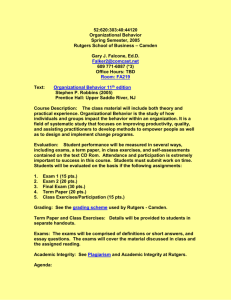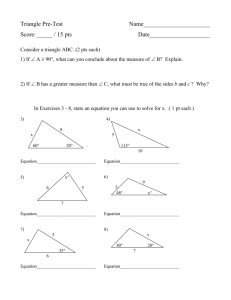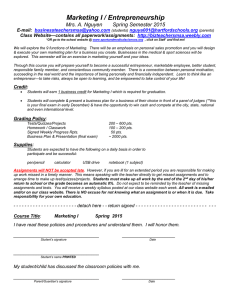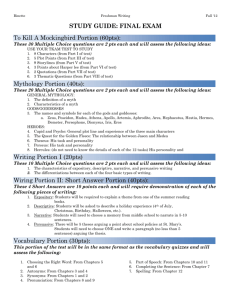Econ 101 | Macroeconomics - MoserCollegeHypermediaSyllabi
advertisement
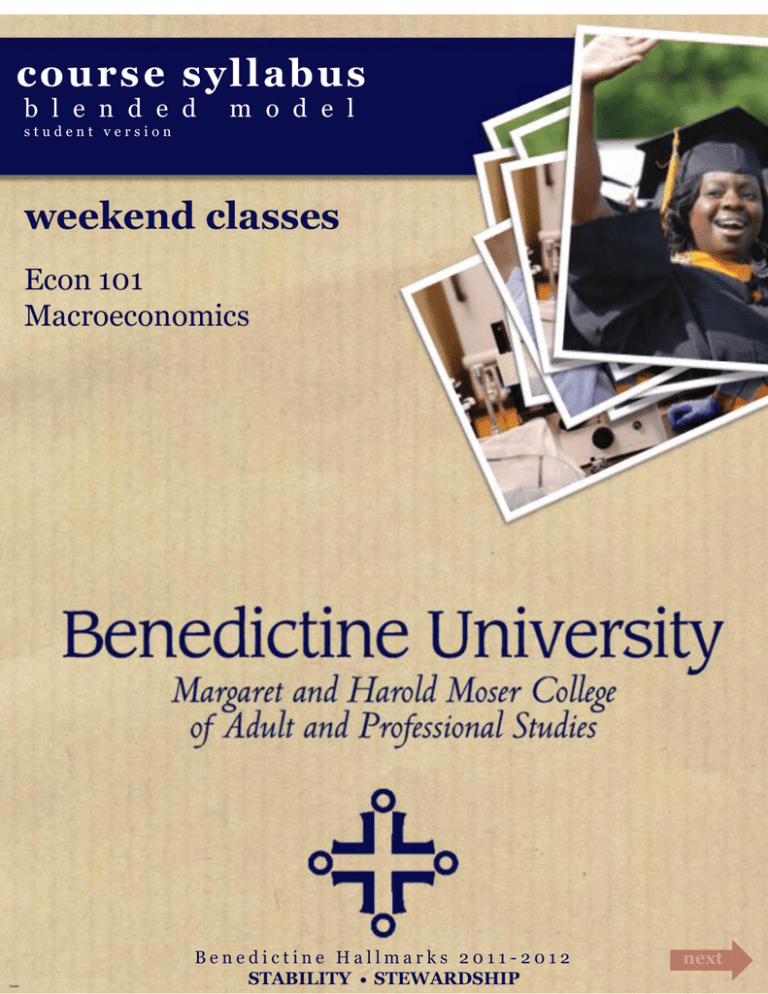
course syllabus b l e n d e d m o d e l student version weekend classes Econ 101 Macroeconomics home Cover about expectations resources course overview learning outcomes Benedictine Hallmarks 2011-2012 STABILITY STEWARDSHIP IDEA schedule & sessions next course syllabus Addresses the educational needs of adult students by developing and providing engaging, relevant and accelerated programs. blended model Econ 101 Enhances scholarship, leadership skills, social responsibility, and promotes life-long learning. Provides high-quality, easily accessible educational opportunities for adult learners. Macroeconomics Enables adults to earn specific undergraduate and graduate degrees while maintaining their personal and professional commitments. student version contents links about this document about Moser College about blended learning hallmarks of a Benedictine education student expectations attendance policy submission of work netiquette _________________________ IDEA objectives & IDEA description course overview required textbooks grading scale learning outcomes course schedule external links Develops new degree and non-degree programs that address the expressed needs of the professional community. financial aid library resources Academic Honesty Policy APA formatting and style APA resources for students Student Success Center (SSC) services for students with disabilities Moser College Mission Statement: Moser College embodies the values of respect, excellence, collaboration, and professionalism. We are committed to delivering innovative and dynamic programs designed for adult students who are dedicated to enhancing their professional, local, and global communities. _________________________ Benedictine Current Students Moser Center Student Information Student Login to D2L Student E-Mail Login Academic Calendars BenUConnect MyBenU Moser College Vision Statement: To be one of the premier university colleges in the nation. Love of Christ and Neighbor Prayer Stability Conversatio Obedience Discipline Humility Stewardship Hospitality Community Benedictine University home about expectations Margaret and Harold Moser Center 1832 Centre Point Circle Naperville, IL 60563 resources course overview learning outcomes Phone: (630)schedule 829-6289& IDEA sessions Fax: (630) 829-1375 http://www1.ben.edu/programs/a dult_cohorts/mission_vision.asp 2 Content Links Econ 101 | Macroeconomics About Your Program at Benedictine University – Moser College About This Document This is a hypermedia document – it has been built to mimic navigation on the web. This document can also be viewed as a presentation or it can be printed like a traditional document. We use this sort of document because it allows for navigation links (hyperlinks) to text, graphics, audio/video, and the web. This type of document also allows you to navigate in a nontraditional, nonlinear way – by following the page links you are not bound to read or flip through the document in any sort of order. This is yet another example of Moser College’s commitment to advancements in technology and blended learning. About Moser College The Moser College of Adult & Professional Studies delivers its curricular programs in a specifically designed structure deliberately oriented for working, adult learners. The Moser College is committed to providing a learning environment which extends beyond the classroom and is designed specifically to meet the needs of its students and their employers by bringing a quality educational experience without requiring the student to relocate or travel extensively beyond their home area. Benedictine University's Moser College of Adult & Professional Studies is fully accredited by the Higher Learning Commission of the North Central Association of Colleges and Schools*. * http://www.ben.edu/academic_programs/moser/about/index.cfm About Blended Learning Blended learning is the integration of different learning environments: mainly the online format with the face-to-face format, but may also include mobile learning. Blended learning, also referred to as hybrid learning, relies on both the advantages of digital/technology innovation and the methods of face-toface instruction. At Moser College, we use blended learning by combining asynchronous online classroom sessions with a face-to-face classroom environment. hallmarks of a Benedictine Education: home about expectations resources course overview learning outcomes IDEA schedule & sessions Love of Christ and Neighbor Prayer Stability Conversatio Obedience Discipline Humility Stewardship Hospitality Community 3 About Econ 101 | Macroeconomics The Ten Hallmarks of a Benedictine Education A Benedictine Education Based on the Rules of Saint Benedict, a Benedictine Education is based on the Benedictine Wisdom Tradition that sets as its goals the transformation of the Human mind AND Heart and has at its foundation “The Ten Hallmarks of a Benedictine Education”. The Ten Hallmarks Each academic year Moser College will be celebrating two of the Hallmarks. This academic year 2011-2012, the Hallmarks Stability and Stewardship have been chosen. The ten hallmarks are: 1. Love of Christ and Neighbor 2. Prayer: a Life marked by liturgy, lection and Mindfulness 3. Stability: commitment to the daily life of this place, its heritage and tradition 4. Conversatio: the way of formation and transformation 5. Obedience: a commitment to listening and consequent action 6. Discipline: a way toward learning and freedom 7. Humility: knowledge of self in relation to God, others and creation 8. Stewardship: responsible use of creation, culture and the arts 9. Hospitality: openness to others 10. Community: call to serve the common good home about expectations resources Portrait (1926) by Herman Nieg (1849–1928); Heiligenkreuz Abbey, Austria course overview learning outcomes IDEA schedule & sessions Love of Christ and Neighbor Prayer Stability Conversatio Obedience Discipline Humility Stewardship Hospitality Community 4 Hallmarks Econ 101 | Macroeconomics Student Expectations Expectations of Students In order to get the maximum use of the time available, it is expected that you will: • Read the material to be covered in the class and complete required assignments prior to attending the class/session; • Arrive/login to class/session prepared to participate actively; • Be prepared to actively participate in the collaborative activities of each class/session; and • Always feel free to seek additional help from the instructor when the need arises. Attendance Policy Students may not miss more than 25% of the live classroom sessions. Doing so will result in an F for the course. financial aid information Submission of Work All assignments are to be submitted into Desire 2 Learn (D2L) unless otherwise noted by instructor. Assignments must be submitted by due date. Any assigned work submitted late for any unexcused reason will receive a lowered grade. Please refer to your instructor’s late work policy located in D2L. In the event that you miss an examination for due cause, arrangements must be made with the instructor for a make-up examination. Important criteria concerning the submission of work: • Make-up examinations may differ from the original class examination. • Per University policy, assignments cannot be accepted by an instructor after the last day of the course. • Only discussions threads posted by 11:59 pm CST on the due date will count for grading purposes. information concerning netiquette: home about expectations resources course overview learning outcomes IDEA schedule & sessions Love of Christ and Neighbor Prayer Stability Conversatio Obedience Discipline Humility Stewardship Hospitality Community 5 Expectations Econ 101 | Macroeconomics About Netiquette What is Netiquette? "Netiquette" stands for "Internet Etiquette", and refers to the set of practices which help to make the online experiences pleasant for all involved. As you might expect, netiquette, like other forms of etiquette, is about courtesy, manners, codes of behavior, protocols and respect. Netiquette primarily focuses on how we interact with one another online, by being aware of: our use of language, others’ cultural background, conventional norms, and other behaviors. Below you will find guidelines concerning the basics of online interaction. If it isn’t something you would say or do in the face-to-face classroom, it is probably inappropriate in the online class as well. Netiquette Basics 1. Follow the Golden Rule (“One should treat others as one would like others to treat oneself”) 2. Be ethical, fair, tolerant and mindful of others – avoid stereotyping, judgment and prejudice 3. Know the boundaries of particular cyberspaces – what is acceptable in a text or chatroom with friends may not be appropriate in a classroom or in an online conversation with an instructor 4. Respect the time of others by: 1) using descriptive subject lines, 2) resizing images for the web, 3) providing links instead of copying and pasting content, 5) using white space by inserting blank lines between paragraphs and headers and 6) limiting your use of attachments 5. Copy the minimum number of people – it is tempting to send “email” or “message blasts” because it is easier for the poster, but it is not easier for the reader Inappropriate Online Usage 1. Avoid “flaming” – flaming is sending offensive, insulting or criticizing messages. This happens more often online then in face-to-face interaction, because there is an illusion of anonymity. 2. Flaming is neither productive nor appropriate for the learning environment 3. Always avoid flaming when it comes to content and opinions, but also avoid it when it comes to grammar, punctuation and spelling corrections 4. Avoid using CAPS if possible and never type messages in ALL CAPS – this is considered yelling and is often seen as a form of aggression 5. Use emoticons ( :) , :( , :-) ) sparingly and avoid the use of JK, BRB, LOL and other text language Confidentiality and Privacy 1. 2. 3. 4. Email, messaging and posting are forms of written record and are just as permanent as a letter or document Do not publicize your own or others’ personal information (such as email, phone numbers, last names etc.) Respect copyright and cite any and all sources Do not expect that your communications are private, instead assume all communications are public For more information please review Netiquette by Virginia Shea home about expectations resources course overview learning outcomes IDEA schedule & sessions Love of Christ and Neighbor Prayer Stability Conversatio Obedience Discipline Humility Stewardship Hospitality Community 6 Netiquette Econ 101 | Macroeconomics Individual Development and Educational Assessment IDEA Objectives • Acquiring skills in working with others as a member of a team. • Developing creative capacities (writing, inventing, designing, performing in art, music, drama, etc.) • Gaining a broader understanding and appreciation of intellectual/ cultural activity (music, science, literature, etc.) • Developing skill in expressing oneself orally or in writing. • Learning how to find and use resources for answering questions or solving problems. • Developing a clearer understanding of, and commitment to, personal values. • Learning to analyze and critically evaluate ideas, arguments, and points of view. • Acquiring an interest in learning more by asking questions and seeking answers. IDEA Description The IDEA student survey focuses on the instructor’s learning objectives for the course and on the progress each student made toward achieving those objectives. By answering thoughtfully and honestly, your ratings and comments will be much more helpful – to the instructor, the department chair, and the dean of the college. As students, you should also know that student ratings and comments have been used to help evaluate courses and to improve the educational experience at Benedictine University. The appropriate standard of conduct with respect to student surveys is thoughtful comments and constructive criticism – respectfully communicated. A Focus on Learning “The IDEA Student Ratings system looks at instruction in terms of its endgame. Rather than emphasizing teaching style or personality, the IDEA system focuses on student learning and the methods used to facilitate it.” – from the IDEA website: www.theideacenter.org/node/5 home about expectations resources course overview learning outcomes IDEA schedule & sessions Love of Christ and Neighbor Prayer Stability Conversatio Obedience Discipline Humility Stewardship Hospitality Community 7 IDEA Econ 101 | Macroeconomics Student Weekend Course Overview Course Description Determination of income, employment, and price level. Effects of fiscal and monetary policies. Course Materials Required Textbook and Materials Boyes, William & Melvin, Michael (2011). Fundamentals of Economics. (5th ed.). ISBN: 9780538481199 Suggested Course Materials Wall Street Journal, cnbc.com, marketwatch.com , info.com/economic publications Technological Computer Requirements Students in the Blended program will need: High-speed Internet access; a sound card and speakers; Windows XP (minimum)/Windows 7 (recommended) or Mac OS X 10.5 or higher; and Firefox 3.6 or higher. It is also highly recommended that students have access to a microphone or webcam for optional audio/videoconferencing. Discussion Forum Guidelines The Course Grading Scale A = 4.00 90 - 100% EXCELLENT B = 3.00 80 – 89% GOOD C = 2.00 70 – 79% SATISFACTORY D = 1.00 60 – 69% PASS F = 0.00 BELOW 60% FAIL I = INC INCOMPLETE home about expectations resources To receive a minimum passing grade, students must make a post to each discussion question for that week by day 4 of each week and respond to at least two other postings by the end of the week. Individual Posts are worth up to 5 points and the total Response Posts are worth up to 5 points total. Each discussion will total up to 10 points. course overview learning outcomes IDEA schedule & sessions Love of Christ and Neighbor Prayer Stability Conversatio Obedience Discipline Humility Stewardship Hospitality Community 8 Course Overview Econ 101 | Macroeconomics Student Weekend Course Outcomes Learning Outcomes Assignments Points Discuss the scope of economics and methodology in solving problems Construct examples of private property rights, Economic Freedom Create Supply, Demand and Market Equilibrium Curves Elaborate on Labor Markets and Government Intervention Construct Marginal Cost and Profit Maximization Graphs Discuss production and Cost Theory in the short run Test the theory of profit-maximization Compile data on Perfect Competition and Monopolistic Competition Individual chapter problems Individual chapter problems Discussion Post Team Assignment/ Activity Individual chapter problems Individual chapter problems Discussion Post Team Assignment/ Activity 10 pts 10 pts 10 pts Discuss Business, Government and Society Predict the outcome of the lack of government intervention Discuss antitrust, externalities and social regulation Compose an argument why government intervention is necessary Propose ways to improve GDP Construct your own market of goods based on purchases you made Test your knowledge base (First in-Class exam) chapters 1-8 Discussion of Final Project Individual chapter problems Individual chapter problems Discussion Post Team Assignment/ Activity Individual chapter problems Discussion Post Team Assignment 10 pts 10 pts 10 pts Discuss unemployment, inflation and Business Cycles Design and plot data for leading indexes Design Aggregate Demand and Aggregate Supply Curves Discuss aggregate supply and demand Elaborate on Fiscal Policy in the United States Compile and predict the monetary changes in the global economy Test your knowledge base (second in-class exam) Chapters 9-14 Progress Reports on Final Projects Individual chapter problems Individual chapter problems Discussion Post Team Assignment/ Activity Individual chapter problems Individual chapter problems Discussion Post Team Assignment/ Activity Discuss Monetary Policy and Economic Policy Construct a derivative to increase the money supply Choose the factors that affect the macro economy Propose recommendations to the Federal Reserve System Build Issues n International Trade, Finance and Globalization Develop a model of international trade Discuss the costs and benefits of globalization Test your knowledge (Group Presentation) Individual chapter problems Individual chapter problems Discussion Post Team Assignment/ Activity Individual chapter problems Individual chapter problems Discussion Post Team Assignment/ Activity 10 pts 10 pts 10 pts 10 pts 10 pts 25 pts 10 pts 10 pts 10 pts 10 pts 10 pts 25 pts 10 pts 10 pts 10 pts 10 pts 10 pts 40 pts Total Points for course 300 pts about Bloom’s Taxonomy home about expectations resources course overview learning outcomes IDEA schedule & sessions Love of Christ and Neighbor Prayer Stability Conversatio Obedience Discipline Humility Stewardship Hospitality Community 9 Learning Outcomes Econ 101 | Macroeconomics Student Weekend Course Schedule Session Loc. Class Title Assignments 01 A F2F Your Economic World • • • • • 01 B F2F Economic Relationships National and International Economies • • • • • 02 A online Your Economic World Market Forces • • • • 02 B online Economic Relationships National and International Economies • • • • home about expectations Reading Assignment: No pre-class assignment; Chapters 1-3 , pages 4-75 will be reviewed in class, Read Chapters 4-6 costs and profit maximization, pages 78 – 127. Individual Assignments - Read and Review chapters 4-6 for class discussion; Individual chapter exercises Study Group Assignments - none In Class Assignments - Review syllabus and course expectations Introduce the concepts of Property Rights, Economic Freedom; Opportunity Costs, and Market Functioning; Review all individual and team exercises from chapters 1-3; Facilitate a discussion on Chapters 4-6, costs and profit maximization; Activity: the DeBeers diamond cartel Reading Assignment: Chapters 7 and 8, market forces, pages 129 – 179; Chapters 9 and 10, national and international economies, pages 181 – 220. Individual Assignments - Read and review chapters 7 and 8, individual chapter problems; Quiz #1, in class, chapters 1 – 8; Read and review chapters 9 and 10, individual chapter problems. Study Group Assignments - Introduction of the final project: Final project will be to research a current economic issue, using theories learned in this course. This assignment will be a 10 page paper, and will be evaluated based upon demonstration of mastering the principles learned in this course. The final project will be due in week 4. In Class Assignments - Activity: the international trade game, ttp://www.economicsnetwork.ac.uk; Discuss chapters 9 and 10. Reading Assignment: Chapter 4-6; Chapter 7 and 8, pages 129 – 179, Individual Assignments - Chapter 1, exercises 1-4, page 19 ; Chapter 4, exercises 1 – 3, page 88; Chapter 5, exercise 8, page 103 Study Group Assignments - Chapter 2 exercises 1-3 (page 52); Chapter 3 exercises 1-3 (page 73); Chapter 5, exercises 1 – 4, page 102; Chapter 6, exercises 4 – 9, page 124 Discussion Questions: Labor Markets; The results of competition Reading Assignment: Chapter 9 and 10, pages 181 – 220 ; Chapter 11 and 12, pages 221 – 272 Individual Assignments - Chapter 7, exercises 1 – 4, page 148; Chapter 9, exercises 8 – 10, page 194 Study Group Assignments - Chapter 7, exercises 6 – 9, page 148; Chapter 8, exercises 1 – 7, page 175; Chapter 9, exercises 1 – 3, page 194; Chapter 10, exercises 1 and 2, page 216; Work on final project Discussion Questions: Social regulation: Gross domestic product resources course overview learning outcomes IDEA schedule & sessions Love of Christ and Neighbor Prayer Stability Conversatio Obedience Discipline Humility Stewardship Hospitality Community 10 Course Schedule Econ 101 | Macroeconomics Student Weekend Course Schedule Session Loc. Class Title Assignments 03 A F2F Macroeconomic Balance Monetary Issues • • • • 03 B F2F Economic Policy • • • • • • • 04 A online Macroeconomic Balance Monetary Issues • • • • • 04 B online Economic Policy Global Economics Submit group project final paper home about expectations • • • • • • Reading Assignment: Chapters 13 and 14, pages 273 – 315 and be prepared to discuss in class; Chapters 15 and 16 , pages 317 – 365; Chapters 17 and 18, pages 368-407 Individual Assignments: Read and review chapters 11 and 12; Quiz #2, in class, chapters 9 – 12; Read and review chapters 13 and 14 ; Individual update on team project Study Group Assignments: none In Class Assignments - Role-play on unemployment to illustrate issues addressed in the topics covered (see instructor’s manual); Facilitate and review individual and group assignment exercises from chapters 9 and 10; Discuss progress on group projects; Work on group project Reading Assignment: Chapters 17 & 18 pages 369-406 Individual Assignment: Review Quiz #2 and discuss homework exercises. Activity/Team Assignment: Discussion/Role Play on World Trade Organization. Reading Assignment: none Discuss final presentation. Discuss chapters 15 – 18 Activity/Team Assignment: Debate on Globalization. Reading Assignment: Chapter s 15 and 16, monetary issues, pages 317 – 365; Chapter s17 and 18, pages 369 – 406 Written Assignment: Individual Chapter 11, exercises 1, 4 and 6, page 242; Chapter 13, exercises 1 – 3, page 289. Team: Chapter 11, exercises 9 and 10, page 242; Chapter 12, exercises 15 – 17, page 269; Chapter 13, exercises 7 – 9, page 289; Chapter 14, exercises 3, 5 and 8, page 310; Work on final project Discussion Topic: Market Equilibrium, Federal Reserve Written Assignments Individual. Chap 15, exercises 1-5, page 340, Chap 16, exercises 6 and 7, page 364 Study Group Assignment, Chap 15, exercises 7 and 8, Chap 16, exercises 10-14, page 364. Discussion Topic: Fiscal Policies and Economic Growth Reading Assignment: Review Chapters 17 & 18, pages 369-406 Submit group project final paper Discussion Topic: market equilibrium resources course overview learning outcomes IDEA schedule & sessions Love of Christ and Neighbor Prayer Stability Conversatio Obedience Discipline Humility Stewardship Hospitality Community 11 Course Schedule
